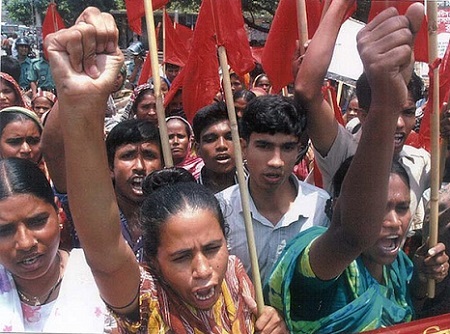
Also see this related article from TowardFreedom.com: Walmart’s Summer of Discontent: Retail Empire Faces Worker Dissent in US and Bangladesh
Exclusive stores in Manhattan, London and Milan are busily stocking shelves with the one-shouldered dresses and Miley Cyrus-esque crop tops that were on display earlier in September at New York City’s Fashion Week.
But half a world away, in the city where the western world’s clothes are actually made, the sewing machines have stopped.
More than 300 garment factories are currently shut down in Dhaka, Bangladesh, as hundreds of thousands people — mostly women — take the the streets in the third day of sweeping protests for wage increases in the notoriously exploitative industry.
The latest round of protests began on Saturday, when approximately 50,000 women rallied in Dhaka to demand a wage increase to just over $100 a month. The rally appeared to have been aimed at actually stopping production rather than making appeals to public officials or the international community. About 10,000 women blocked the highway about 18 miles north of the capital city, halting traffic. Many of the remaining 40,000 women rallied outside various factories, forcing them to close operations for the day.
The demonstrations continued to grow on Sunday. By Monday, the police chief of the region’s industrial district reported that about 200,000 people employed in the garment industry were demonstrating in the streets, prompting the closure of some 300 factories that supply clothing to Walmart and other western companies. The desired wage increase, up to $103 a month, would represent a more than doubling of the women’s current salaries, which averages about $38 a month.
Since last April’s collapse of a factory building killed more than 1,000 people, Bangladesh’s government and the country’s garment industry have been under scrutiny. The European Union threatened to cut trade benefits to Bangladesh over the summer, prompting the nation’s government to pass legislation aimed at increasing factory safety and strengthening workers’ rights. There was also talk of increasing the minimum wage, but the move was bitterly opposed by Bangladeshi factory owners, who are under pressure by western retail brands to keep the price of clothing low.
Meanwhile, some European companies agreed to sign a pact to commit to improving and monitoring building and fire safety in the factories where their clothes are made. However, the pact was undercut by the refusal of U.S.-based retailers, including Walmart, the Gap, Macy’s, Target, J.C. Penney, Nordstrom, Foot Locker and The Children’s Place, to sign — a move that sparked outrage among some of their consumers.
Many of these companies, particularly Walmart, have also recently become the targets of a growing low-wage worker campaign in the United States. Thousands of employees have walked off the job at Walmart and other retail outlets over the last year in protest of the corporation’s low-wage pay. People employed by Walmart in the United States make, on average, a little less than $9 a hour, which is about the same as a woman working in a Bangladeshi factory producing Walmart clothes currently makes each week. Neither provides a living wage.
As Waging Nonviolence writer Matthew Cunningham-Cook explained last October, the U.S. strikes against Walmart have increasingly leveraged the realities of globalization against the corporation by orchestrating targeted strikes at various points across the domestic supply chain. Late last year, the strikes against Walmart went global, with protests in Argentina, Uruguay, India, South Africa and the United Kingdom. Meanwhile, U.S. protesters rallied at a port in New Jersey in efforts to block shipments of Walmart’s inventory arriving in a container ship from factories in Bangladesh.
As the Bangladesh garment factory protests continue to grow, the key question is whether these uprisings at the point of production will become the final link in the increasingly globalized and connected opposition to these low-wage retail corporations.
Laura Gottesdiener is a freelance journalist in New York City. She is the author of A Dream Foreclosed: Black America and the Fight for a Place to Call Home, forthcoming from Zuccotti Park Press.
